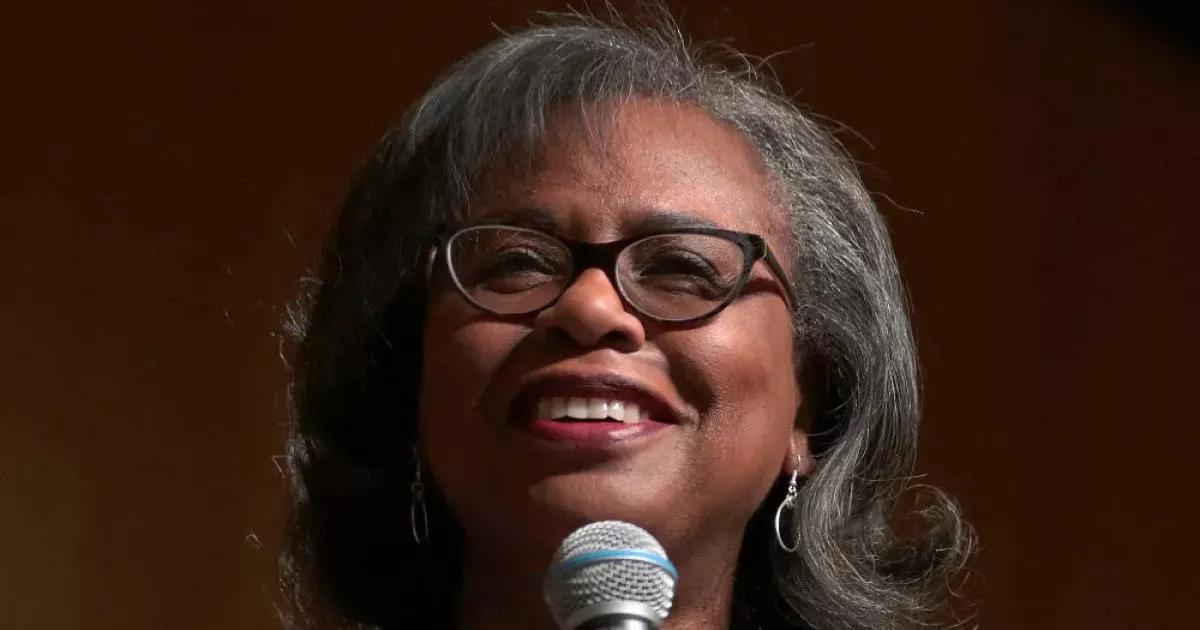Anita Hill is a prominent figure in American history, known for her courageous testimony against Supreme Court nominee Clarence Thomas in 1991. As a law professor at Brandeis University, her expertise lies in social policy, law, and women's studies. Hill's accusations of sexual harassment against Thomas, her former supervisor, sparked national debate and brought issues of workplace harassment to the forefront of public consciousness.
July 30, 1956: Birth of Anita Faye Hill
Anita Faye Hill was born on July 30, 1956.
1973: High School Graduation
Anita Hill graduates from Morris High School in Oklahoma as valedictorian in 1973.
1977: Bachelor's Degree in Psychology
Anita Hill received her bachelor's degree in psychology from Oklahoma State University in 1977.
1980: Admitted to the District of Columbia Bar
Anita Hill was admitted to the District of Columbia Bar and began her law career as an associate at Wald, Harkrader & Ross in Washington, D.C. in 1980.
1980: Juris Doctor from Yale Law School
In 1980, Anita Hill earned her Juris Doctor degree from Yale Law School in New Haven, Connecticut.
1981: Attorney-Advisor to Clarence Thomas at the U.S. Department of Education
In 1981, Anita Hill became an attorney-adviser to Clarence Thomas, then Assistant Secretary of the U.S. Department of Education's Office for Civil Rights.
1982: Assistant to Clarence Thomas at the EEOC
Anita Hill served as assistant to Clarence Thomas at the U.S. Equal Employment Opportunity Commission (EEOC) starting in 1982.
1983: Departs from EEOC
Anita Hill left her position at the EEOC in 1983.
1983: Assistant Professor at Oral Roberts University
From 1983 to 1986, Anita Hill worked as an assistant professor at the Evangelical Christian O. W. Coburn School of Law at Oral Roberts University.
1986: Joins Faculty at the University of Oklahoma College of Law
Anita Hill joined the faculty at the University of Oklahoma College of Law in 1986, where she taught commercial law and contracts.
1989: First Tenured African American Professor at OU
In 1989, Anita Hill achieved a significant milestone by becoming the first tenured African American professor at the University of Oklahoma.
October 11, 1991: Anita Hill Publicly Testifies Against Clarence Thomas
On October 11, 1991, Anita Hill delivered a public testimony in televised hearings, alleging that Clarence Thomas had sexually harassed her while he was her supervisor at the Department of Education and the EEOC.
1991: Hill's Senate Judiciary Committee testimony recognized
Anita Hill's opening statement to the Senate Judiciary Committee in 1991 was ranked No. 69 in American Rhetoric's Top 100 Speeches of the 20th Century.
1991: Impact of Hill's Testimony on Sexual Harassment Legislation and Awareness
Following the Thomas confirmation hearings in 1991, President George H.W. Bush dropped his opposition to a bill granting harassment victims the right to pursue federal damage awards, back pay, and reinstatement, leading to its passage by Congress. Harassment complaints filed with the EEOC increased significantly, and public opinion shifted in Hill's favor. Private companies implemented training programs to address and prevent sexual harassment.
1991: Anita Hill accuses Clarence Thomas of Sexual Harassment
In 1991, Anita Hill emerged as a national figure when she accused Clarence Thomas, then a nominee for the U.S. Supreme Court, of sexual harassment during his time as her supervisor at the U.S. Department of Education and the EEOC.
1991: Clarence Thomas Nominated to the Supreme Court
President George H.W. Bush nominated Clarence Thomas to succeed retiring Associate Supreme Court Justice Thurgood Marshall in 1991.
1992: Hill receives ABA's "Women of Achievement" award
Anita Hill was honored with the American Bar Association's Commission on Women in the Profession's "Women of Achievement" award in 1992.
1992: Nationwide fundraising campaign for professorship in Hill's honor
In 1992, a feminist group initiated a nationwide fundraising campaign and secured matching state funds to endow a professorship at the University of Oklahoma College of Law in honor of Anita Hill.
1992: Year of the Woman
The Senate Judiciary Committee's handling of Hill's accusations sparked outrage among female politicians and lawyers. D.C. Congressional Delegate Eleanor Holmes Norton suggested that Hill's experience contributed to the record number of women elected to Congress in 1992. Gloria T. Hull, Patricia Bell-Scott, and Barbara Smith, in their anthology "All the Women Are White, All the Blacks Are Men, but Some of Us Are Brave," highlighted the mobilization of Black feminists in response to the Hill-Thomas controversy.
1993: Hill inducted into Oklahoma Women's Hall of Fame
Anita Hill was inducted into the Oklahoma Women's Hall of Fame in 1993.
1993: David Brock Publishes "The Real Anita Hill"
David Brock, a writer for the conservative magazine American Spectator, published "The Real Anita Hill", a book that fueled doubts about the veracity of Hill's 1991 testimony among conservatives in 1993.
1994: Hill writes tribute to Thurgood Marshall
In 1994, Anita Hill authored a tribute titled "A Tribute to Thurgood Marshall: A Man Who Broke with Tradition on Issues of Race and Gender," honoring the legacy of Thurgood Marshall, the first African American Supreme Court Justice.
1994: "Strange Justice: The Selling of Clarence Thomas" is Published
Jane Mayer and Jill Abramson, journalists for The Wall Street Journal, wrote "Strange Justice: The Selling of Clarence Thomas," a book that concluded that Thomas had lied during his confirmation process in 1994.
1995: Hill co-edits "Race, Gender and Power in America"
Anita Hill co-edited the book "Race, Gender and Power in America: The Legacy of the Hill-Thomas Hearings" with Emma Coleman Jordan in 1995.
October 1996: Hill resigns from University of Oklahoma
Anita Hill resigned from her position at the University of Oklahoma in October 1996 after facing years of pressure following her testimony against Clarence Thomas. She concluded her final semester teaching a seminar on civil rights.
1996: Departs from the University of Oklahoma
Anita Hill left the University of Oklahoma in 1996 following calls for her resignation, which began after her 1991 testimony against Clarence Thomas.
January 1997: Hill becomes visiting scholar at UC Berkeley
Anita Hill accepted a visiting scholar position at the Institute for the Study of Social Change at the University of California, Berkeley in January 1997.
1997: Hill publishes autobiography, "Speaking Truth to Power"
Anita Hill released her autobiography, "Speaking Truth to Power," in 1997, detailing her experiences during the Clarence Thomas confirmation hearings and her lifelong commitment to social justice.
October 20, 1998: Hill publishes "Speaking Truth to Power"
Anita Hill released her book "Speaking Truth to Power" on October 20, 1998, offering her perspective on the sexual harassment controversy involving Clarence Thomas and providing insights into her personal and professional life.
1998: Visiting Scholar at Brandeis University
Anita Hill became a visiting scholar at Brandeis University in 1998.
May 1999: Anita F. Hill professorship defunded
After five years of pressure from conservative Oklahoma state legislators following Hill's testimony against Clarence Thomas, the University of Oklahoma Law School defunded the Anita F. Hill professorship in May 1999 without the position ever being filled.
2003: Hill contributes to "Sisterhood Is Forever" anthology
Anita Hill contributed an essay titled "The Nature of the Beast: Sexual Harassment" to the 2003 anthology "Sisterhood Is Forever: The Women's Anthology for a New Millennium," edited by Robin Morgan.
2005: Hill selected as Fletcher Foundation Fellow
In 2005, Anita Hill was chosen as a Fletcher Foundation Fellow.
2007: Hill advocates for women in leadership
Anita Hill contributed a chapter to the 2007 book "Women and leadership: the state of play and strategies for change," advocating for greater representation of women in leadership positions, particularly within the judicial system. She emphasized the importance of diverse perspectives and experiences for a balanced and just legal system.
2007: Clarence Thomas Publishes Memoir, Reigniting Controversy
Clarence Thomas published his autobiography, "My Grandfather's Son," in 2007, revisiting the controversy with Anita Hill. Thomas labeled Hill his "most traitorous adversary" and accused pro-choice liberals of exploiting the scandal against him. Hill refuted the accusations in a New York Times op-ed, asserting that she would not remain silent while Justice Thomas attempted to "reinvent" her.
2007: Differing Opinions and Perspectives on the Controversy
In 2007, Kevin Merida, co-author of a book on Thomas, stated that what transpired between Thomas and Hill remained "ultimately unknowable" to others. Neil Lewis of The New York Times observed that both sides of the highly publicized dispute continued to have their unwavering believers.
2008: Hill receives Louis P. and Evelyn Smith First Amendment Award
Anita Hill was granted the Louis P. and Evelyn Smith First Amendment Award by the Ford Hall Forum in 2008.
October 2010: Virginia Thomas Requests Apology from Anita Hill
Virginia Thomas, wife of Clarence Thomas, left a voicemail for Anita Hill in October 2010, requesting an apology for her 1991 testimony. Hill, initially believing it to be a prank, involved Brandeis University campus police, who informed the FBI. Upon confirmation that the call was from Virginia Thomas, Hill stated to the media that she did not perceive the message as conciliatory. Virginia Thomas later claimed that the call was intended as an "olive branch."
2011: Hill publishes "Reimagining Equality"
Anita Hill published her second book, "Reimagining Equality: Stories of Gender, Race, and Finding Home," in 2011, examining the subprime lending crisis and its disproportionate impact on African American homeowners.
2011: Hill joins Brandeis University and Cohen Milstein
In 2011, Anita Hill joined the faculty of Brandeis University, initially with the Women's Studies Program and later the Heller School for Social Policy and Management. Concurrently, she assumed a counsel role at the plaintiffs' law firm Cohen Milstein, focusing on civil rights and employment practices.
March 26, 2015: Hill promoted to Private University Professor at Brandeis
The Brandeis Board of Trustees unanimously voted to promote Anita Hill to the position of Private University Professor of Social Policy, Law, and Women's Studies on March 26, 2015.
2015: University Professor at Brandeis University
Anita Hill assumed the role of a university professor at Brandeis University in 2015.
December 16, 2017: Hill leads Commission on Sexual Harassment in Entertainment
The Commission on Sexual Harassment and Advancing Equality in the Workplace, with Anita Hill at the helm, was established on December 16, 2017, to combat sexual harassment within the entertainment industry. The commission's report revealed a concerning prevalence of bias and disparities in perceptions of discrimination and harassment across demographics.
September 2018: Hill authors op-ed on Christine Blasey Ford allegations
Anita Hill penned an op-ed in The New York Times in September 2018, addressing the sexual assault allegations made by Christine Blasey Ford against Brett Kavanaugh during his Supreme Court nomination process.
November 8, 2018: Hill speaks at USC Dornsife event on ending workplace harassment
Anita Hill delivered a speech at the USC Dornsife event titled "From Social Movement to Social Impact: Putting an End to Sexual Harassment in the Workplace" on November 8, 2018.
April 25, 2019: Joe Biden expresses regret to Hill
On April 25, 2019, Joe Biden's presidential campaign team disclosed that he had called Anita Hill to express his regret for her experience during the Clarence Thomas confirmation hearings, which he chaired as Senate Judiciary Committee Chairman. Hill, however, expressed dissatisfaction with the call.
June 13, 2019: Hill clarifies stance on Biden
On June 13, 2019, Anita Hill clarified her position on Joe Biden, stating that she did not consider his past actions disqualifying and would be open to voting for him.
November 8, 2019: Minor planet named in honor of Anita Hill
On November 8, 2019, the Minor Planet Center published the official naming citation for minor planet 6486 Anitahill, discovered by Eleanor Helin. This naming was done to honor Anita Hill.
May 2020: Hill calls for investigation into allegations against Trump and Biden
In May 2020, Anita Hill urged for investigations into sexual assault allegations against Donald Trump and Joe Biden, advocating for transparency and public disclosure of the findings.
September 5, 2020: Hill pledges to vote for Biden and collaborate on gender issues
Reports emerged on September 5, 2020, indicating that Anita Hill had committed to voting for Joe Biden and expressed willingness to collaborate with him on gender-related matters.
September 28, 2021: Hill publishes "Believing: Our Thirty-Year Journey to End Gender Violence"
Anita Hill's book, "Believing: Our Thirty-Year Journey to End Gender Violence," was published on September 28, 2021.
Mentioned in this timeline

Donald John Trump is an American politician media personality and...

Joe Biden is an American politician who served as the...
California is a U S state on the Pacific Coast...

Washington D C is the capital city and federal district...
Connecticut is a state in the New England region of...

Brett Kavanaugh is an American lawyer and jurist who currently...
Trending

4 minutes ago Luke Hughes' Return to Devils Practice Anticipated After Injury Recovery

4 minutes ago Alexandra Daddario and Andrew Form End Their Three-Year Marriage, Agree to Co-Parent

5 minutes ago Auston Matthews Seeks Olympic Gold: Opportunity to Silence Critics and Lead Team USA

5 minutes ago Gretzky declares himself a 'true Canadian', supports Canada at Olympics despite Trump friendship.

5 minutes ago Team USA Advances to Olympic Hockey Semifinals After Thrilling OT Victory

6 minutes ago Charlie McAvoy aims for Olympic gold; Bethpage honors his mother; Hometown hero.
Popular

Jesse Jackson is an American civil rights activist politician and...
Randall Adam Fine is an American politician a Republican who...

Pam Bondi is an American attorney lobbyist and politician currently...

Barack Obama the th U S President - was the...

Ken Paxton is an American politician and lawyer serving as...

Bernie Sanders is a prominent American politician currently serving as...
